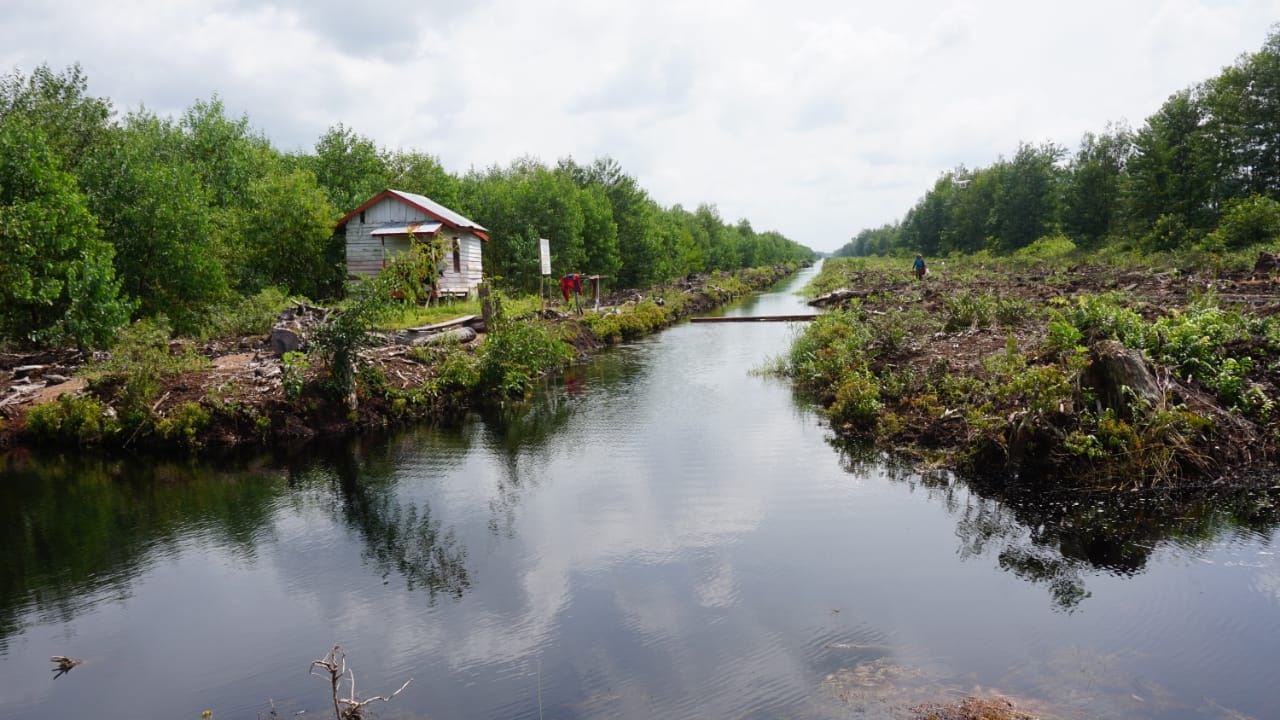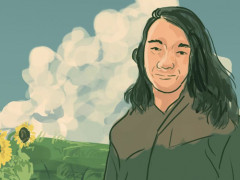Growing Amidst the Crisis
By Pantau GambutPotential for Prolonged Conflict in the Lebung Itam Village Peatlands
Lebung Itam Village, Tulung Selapan District, Ogan Komiring Ilir (OKI) District, covers an area of 30,496 hectares (approximately 84 percent is peatland). Poor peatland management, i.e. land clearance by burning, company activities of building canals that drain the peatland, and a prolonged dry season made this area very prone to fires. Based on Pantau Gambut’s analysis of the Lebung Itam Village, 1023.58 hectares of peatlands were burnt in 2015 and 892.87 hectares of peatlands were burnt in 2019.
The primary source of income for the Lebung Hitam Village community comes from the agricultural and rubber plantations. The local community uses the sonor system to manage their land. Harja (57), a resident of Lebung Hitam, explained that the sonor system is a local community tradition of planting rice, which is usually done during the dry season. The land is prepared by burning shrubs/grass on the peatland. However, this system started to cease after the regulation prohibiting burning for land clearance was issued.
“The people of Lebung Hitam now manages the land very carefully, especially during the dry season. In the past, we cleared the land by burning, but we've stopped such practice," he said some time ago.
Concession and the Emergence of New Issues
The concession companies operating in Lebung Hitam Village present separate challenges in managing forest and land fires in the area. "I don't know if it is a coincidence or whether it is done on purpose. Our area has experienced fires since the company started operating. Companies usually carry out land clearing and planting activities,” added Harja. The Lebung Hitam Village map shows that two concession companies are operating in this area, i.e. PT. Bumi Mekar Hijau (BHM) with a concession area of 22,843 Ha, and PT. Bintang Harapan Palma (BHP) with a concession area of 4,773 Ha.
Yogi Surya Prayoga, a researcher from WALHI South Sumatra, informed that the right to cultivate (HGU) granted to PT BHP is an area with a peat depth of more than 3 meters. In fact, based on the applicable regulations, deep peat cannot be cultivated in accordance with the provisions of Government Regulation Number 57 of 2016 concerning the Protection and Management of Peat Ecosystems.
Yogi also mentioned that the emergence of plantations and canal blocking also caused other issues. "The canals become a problem because water sources are rapidly being depleted, which could result in the extinction of many ecosystems and aquatic biota," he explained.
The plantation activities and the loss of (peat) land greatly affected the community. In addition to weather uncertainty, the dry season started earlier in March, April, and May (in the past the dry season started in July or August).
He believes that the weather uncertainty had affected the community’s agriculture activities, especially in Lebung Hitam Village. A lot of the rubber trees cultivated by the community have withered, with the leaves drying and the stems covered with fungus.
"Due to the reasons above, the community has strongly rejected these plantation companies which causes more harm than good," said Yogi.
Sanctions for Companies Committing Violations
On a separate occasion, the Head of the OKI District Environmental Office, Alamsyah, said that oil palm plantation companies usually build two canals, i.e. a canal for the plantations and a canal for forest fires or firebreaks. “There is generally a barrier for forest and land fires.
It is closed during the dry season to prevent the water from flowing out, hence the water level remains stable at 30 or 40 cm, but the canal is opened during the rain season. “These canals are built for every party’s own interest because they fear that their land would catch fire,” he said.
Furthermore, Alamsyah also stated that sanctions have been imposed on these companies. Almost all of the companies in OKI have been imposed sanctions for forest and land fires. A common sanction is administrative sanctions by the Provincial Environment Office and the Ministry of Environment and Forestry (MoEF).
He explained that when imposed with administrative sanctions, the company is given time to comply with the regulation, e.g. if the company does not have a specific number of canals, the company is required to have a reservoir, which includes fire towers, as well as supporting infrastructure for monitoring. The company is then given time to meet these requirements. If the requirement is not fulfilled within the pre-determined timeline, the company’s license will be suspended.
"The company is prohibited from performing any activities during the license suspension period.” If the company remains unable to implement the provisions above, a recommendation will be issued to revoke their license. We continue to monitor them on a biannual and annual basis," he said.
Community as the Victim
On the other hand, the Director of Walhi in South Sumatera, M Hairul Sobri identified that the palm oil companies in this contributed toward ecological degradation. These greedy companies are destroying the peatland that functions as carbon sinks and converts them into oil palm plantations.
On the other hand, the issues emerging from these massive plantation companies are changes in the community social, cultural, and economic order, which causes many conflicts of interest between members of the community, between the community and the government, and also between the community and the company itself.
"Ironically, the legal settlement for these problematic companies remains weak. There were many cases where the community has become the scapegoats. E.g. forest and land fires. To date, the community has always been the first and primary targets," he said.
According to Hairul Sobri, the government's commitment to dealing with forest and land fires is still far from expectation. The government has been unable to manage this issue fairly. ..
"As a result, the locals and the indigenous people have been criminalized and negatively labeled as environmental destructors," he explained.




